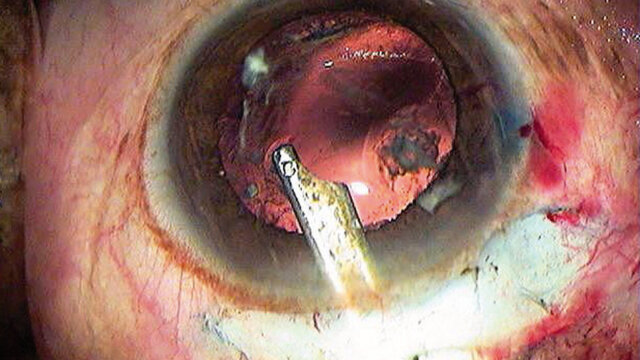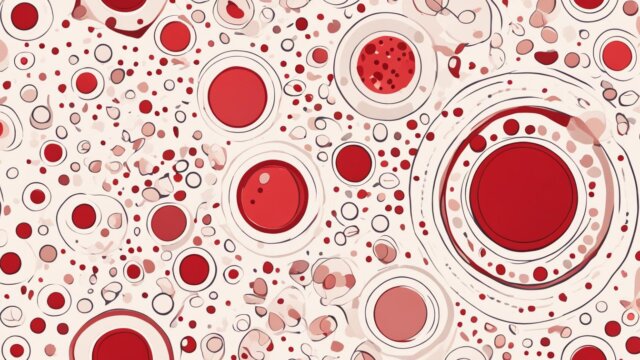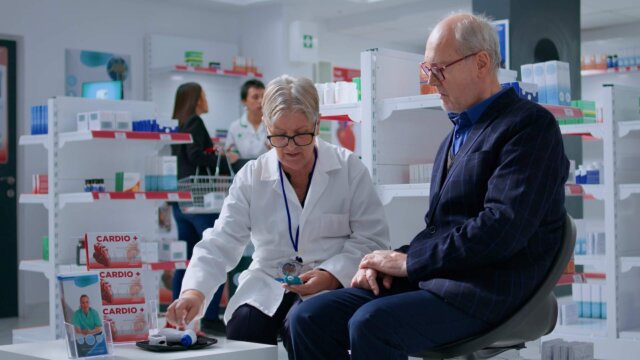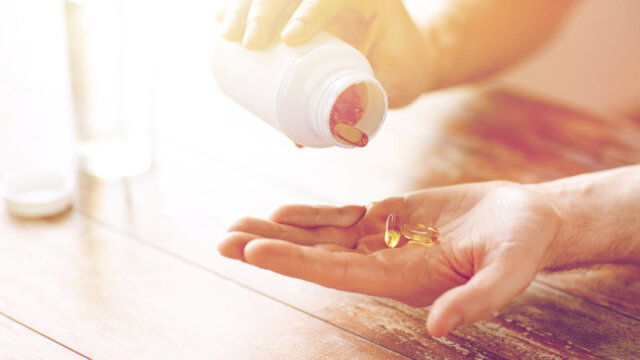FTC disclaimer: This post may contains affiliate links and we will be compensated if you click on a link and make a purchase.
Diarrhea affects nearly one in four Americans every year. It causes a lot of discomfort. But, you don’t have to just deal with it. You can try natural remedies for quick relief at home.
This guide will show you how to adjust your diet and use herbal teas. These steps will help you handle diarrhea well and start feeling better soon.
Key Takeaways
- Diarrhea is a normal issue that often goes away in 5-7 days.
- It’s important to stay hydrated and keep up with your body’s salts, especially for kids and older people.,
- The BRAT diet (bananas, rice, applesauce, toast) might make diarrhea less severe.,
- Probiotics and foods like yogurt can help your gut heal and make diarrhea shorter.
- Medicines you can buy, like Imodium or Pepto-Bismol, work fast to relieve diarrhea.
What Is Diarrhea and What Causes It?
Understanding the Symptoms and Causes of Diarrhea
Diarrhea makes you pass loose, watery stool often. It usually stops within 2 weeks. Many things can cause it. These include infections from viruses, bacteria, or parasites. It can also be from eating bad food or drinking dirty water. Kids often get diarrhea from viruses. When traveling to places without clean water, you might catch traveler’s diarrhea.
If you have diarrhea, you’ll go to the bathroom a lot with loose stool. You may feel pain in your belly and could have trouble controlling your stool. Tests can show how bad it is. You might need your blood, electrolytes, and kidney functions checked. Doctors may also test your stool. This checks for bacteria or parasites causing the problem.
It’s important to figure out what’s causing your diarrhea. This helps with the right treatment. Antibiotics or anti-parasitic medicines might be used. But they don’t work for viral diarrhea.
Doctors might do some tests. These could be for lactose intolerance through your breath. Or they might look inside with a scope.
Sometimes, diarrhea doesn’t go away and lasts more than 14 days. This is chronic diarrhea. It’s a sign of ongoing conditions like Crohn’s disease.
It’s very important to see a doctor if you have ongoing symptoms. Dehydration can be very serious, especially for the young and the old. So, don’t wait to get help if you get dehydrated from diarrhea.
The Importance of Staying Hydrated
Diarrhea can make you lose a lot of fluids and electrolytes, leading to dehydration. This is a big worry for kids and older folks. Losing just a bit of water can cause dehydration because our bodies are mostly water.
The signs of dehydration differ by age. Babies might not wet their diapers for over 12 hours, feel hot, and seem very tired. Grown-ups might not pee much and feel very tired. The elderly might have deep-set eyes, feel dizzy, or act confused. In serious cases, they might need to go to the hospital.
To beat dehydration, keeping well-hydrated is a must. Besides water, diluted fruit juice, rehydration solutions or sports drinks are good. Caffeinated drinks, alcohol, and soda make you lose more fluid, so it’s best to avoid them.
It’s very important to drink enough when you have diarrhea. After all, most of us in the U.S. get diarrhea once a year. Keeping hydrated stops dehydration and helps your body recover from diarrhea’s effects.
So, making sure you drink enough is key with diarrhea. Healthy fluids help your body keep the right balance of water and minerals. This speeds up healing and keeps you well.
The BRAT Diet: Bland Foods to Ease Diarrhea
The BRAT diet includes Bananas, Rice, Applesauce, and Toast to calm your stomach. These foods are gentle and low in fiber, making them perfect for upset stomachs.
This diet helps your body use water better and keeps electrolytes in balance. Bananas are full of potassium, which helps with this. Choosing white rice over brown is easier on your tummy, a vital part of the BRAT plan. Eating unsweetened applesauce lessens sugar intake while dealing with diarrhea. Toast made from white bread is good for digestion too.
What to Eat and Avoid on the BRAT Diet
Add other plain, simple foods to the BRAT list like boiled potatoes, lean meats, and noodles. Drinking Gatorade® or Pedialyte® gives you back lost fluids and keeps you from getting too dry.
Avoid foods that can make diarrhea worse: dairy, sugary treats, deep-fried or oily things, alcohol, caffeine, hot spices, and some veggies and beans.
While the BRAT diet is good for quick help, using it too long can cause you to miss out on important nutrients. Some doctors say not to use it much because it might not be as good as we once thought. If diarrhea lasts more than a few days, be sure to talk to a doctor.
By choosing foods from the BRAT diet and adding other easy foods, you can make your stomach feel better when you have diarrhea. Always drink plenty of fluids and get help from a doctor if you don’t start feeling better soon or get worse.
Probiotics: Restoring Gut Health
Probiotics are tiny live organisms that help the body in many good ways. They are called “good” bacteria and mostly found in the gut. There, they do many jobs that keep us healthy. Using probiotics can help fix an imbalance and make things right again.
The FDA doesn’t oversee probiotics’ use. But doctors suggest using them, especially after sickness or taking antibiotics. They work by strengthening our immunity and fighting off harmful inflammation. For them to work well, they need to have good strains, be safe to eat, and survive our stomach’s acid. Some great probiotic types are the Lactobacillus and Bifidobacterium.
You can get probiotics in many forms, like pills, liquids, and creams. Foods like yogurt, kefir, miso, sauerkraut, and pickles are also full of probiotics. Make sure these foods say “live and active cultures” on their labels. This shows they have live probiotics that can help you.
Studies think a mix of many gut bacteria types can help lower the chances of certain sicknesses. Things like diabetes, IBD, and even joint problems might be less likely with a healthy gut.
Bad gut health can show up in things like gas and upset stomach. It can even mess with your weight, sleep, and parts of your immune system.
Even though we’re still learning about probiotics, they do seem to help with a few health problems. The American Gastroenterological Association suggests taking probiotics in some cases. Like, to avoid stomach infections when on antibiotics, helping babies born too early, and for people with certain gut issues. Still, what probiotics do for you might not be the same for everyone.
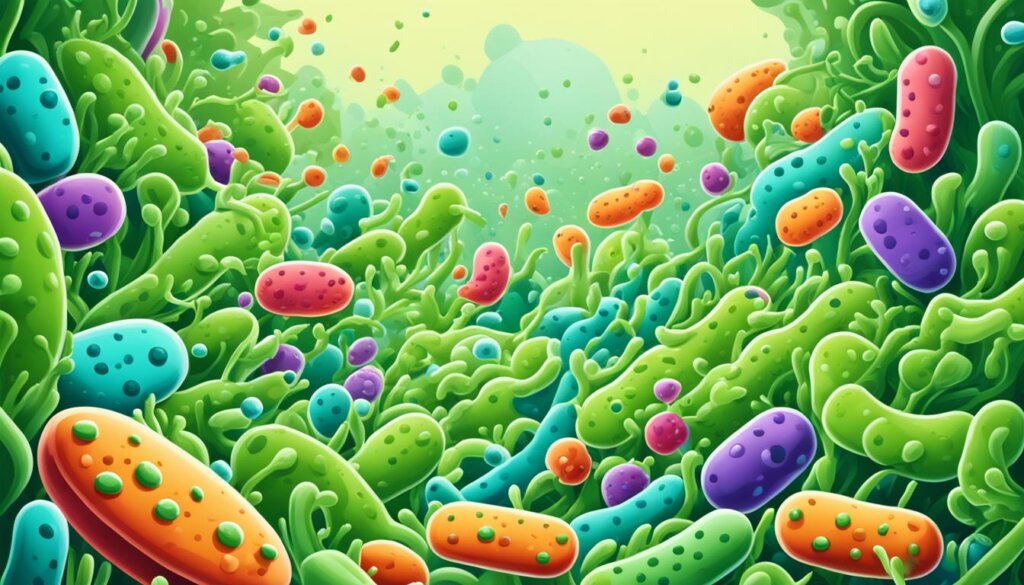
Having a healthy gut is very important for your overall health. Eating foods with probiotics or taking supplements can be a simple way to help your gut and maybe fix some health worries.
OTC Medications for Diarrhea Relief
Dealing with diarrhea? Over-the-counter (OTC) meds can help quickly. Loperamide (Imodium) and bismuth subsalicylate (Pepto-Bismol) are two trusted choices.
Loperamide and Bismuth Subsalicylate: Effective OTC Options
Loperamide slows the gut’s movements to let in more water. Essentially, it helps make stools firmer, easing diarrhea. Bismuth subsalicylate, meanwhile, fights inflammation and kills off germs that cause diarrhea. This can deliver relief, too.
Using these OTCs correctly is key. Adults usually don’t have issues, but some might feel pain, get constipated, dizzy, or sick. Yet, using too much loperamide can affect your heart’s rhythm badly. And too much Bismuth subsalicylate may lead to constipation, blackened tongue or stools, and ear ringing.
Don’t use them if you’re seeing blood in your stool or have a fever. For kids under 2, don’t give loperamide without a doctor’s ok. And avoid Bismuth subsalicylate for kids under 12. It’s also not for those with the flu or chickenpox.
These OTCs can help, but always read and follow the label. If the problem doesn’t get better or it gets worse, see a doctor. This is extra important if you have other symptoms like fever or blood in your stool.
When to Seek Medical Attention
Most of the time, diarrhea goes away within 5-7 days if you treat it at home. Still, there are times when getting medical help is very important.
If you have diarrhea for more than a few days, it does not get better on its own, or you see blood in your stool, have a high fever, or feel very dehydrated, call a doctor right away. This is especially true for young kids and older adults. They should see a doctor if their diarrhea doesn’t get better in 48 hours.
Acute diarrhea usually lasts one or two days but can sometimes go on for up to two weeks. Chronic diarrhea lasts for 30 days or longer. Acute diarrhea is often from an infection, likely by a virus or from food, and it usually stops within a couple of days.
The virus that causes COVID-19 can also bring on these symptoms, including diarrhea. But, if the diarrhea lasts longer than a month, it could be due to something else like IBS, IBD, or lactose intolerance.
If you have certain signs, it’s important to see a doctor:
- Nocturnal stools
- Blood in the stool
- Weight loss
- Fevers
- Night sweats
- Diarrhea happens without eating
Getting a stool study is often the first thing done to figure out why you have chronic diarrhea. It can show if there are any hidden infections or illnesses. Sometimes, more tests like endoscopy or colonoscopy are needed to pinpoint the problem.

It’s better to be safe than sorry with your health. If you’re worried or if the diarrhea doesn’t go away, talk to a healthcare professional.
Preventing Dehydration: Staying Hydrated
Diarrhea makes you lose fluids and electrolytes, making dehydration likely. Stay hydrated by drinking lots of water and drinks rich in electrolytes. Pedialyte or Gatorade can replace lost electrolytes and help you recover. You can also make a rehydration drink at home using salt, sugar, and water.
Oral Rehydration Solutions and Electrolyte Drinks
For dehydrated children, doctors suggest Ceralyte, Infalyte, or Pedialyte. These are specially made to put back fluids and essential electrolytes. Seniors might not feel thirsty but need to drink 1.7 liters of fluid daily if they have diarrhea or vomit, to avoid dehydration.
Active folks should drink 16 to 20 ounces of fluid before heading out. Then, sip on six to 12 ounces every 10 to 15 minutes while active. Afterward, drink another 16 to 24 ounces to recover your fluids.
For light to moderate activities, water is fine, but intense exercises need sports drinks for extra electrolytes. Avoid alcohol or caffeine because they can dehydrate you. Fruit juices might cause tummy troubles due to too many carbs and too little sodium. Health experts say no to sugary drinks for staying hydrated.
To drink more water, always have a bottle with you, pick water instead of sugary drinks, use fruit or drink mixes for flavor, eat water-heavy foods, and space out your water drinking all day.
If diarrhea or vomiting doesn’t stop after two days, or you see signs of dehydration, get medical help. Diarrhea is acute if it lasts 1 to 2 days, or 4 weeks or more makes it chronic. Dehydration can cause serious health problems, like organ damage, kidney failure, and sometimes, even death.
For seniors, kids, and those with weak immune systems, solutions like Pedialyte help avoid dehydration. But for severe cases, such as shock, IV rehydration by doctors is needed.
Home Remedies for Diarrhea
When you have diarrhea, the BRAT diet and lots of water can help. You can also try natural remedies at home. These are gentle and can help your tummy feel better.
Rice Water and Herbal Teas: Natural Relief
Rice water is a tried and true way to help with diarrhea. To make it, boil rice and keep the starchy water. This special water has been shown to make loose stools less frequent.
Herbal teas like chamomile, green tea, and lemongrass can be soothing too. You can drink them hot or cold. They are a nice option to help you feel better.
Other helpful things for diarrhea include:
- Probiotics, like Saccharomyces boulardii and different Lactobacillus types, help make your gut healthy again. They can also make diarrhea go away faster.
- Zinc is another good option. Recommended by the World Health Organization, it can shorten how long you have diarrhea.
- Turmeric is also good. It’s anti-inflammatory and fights germs. But, check with a doctor before using it with some medicines.
- Cinnamon and nutmeg are ancient remedies for diarrhea. You can mix them with warm water or butter. They help with cramps too.
Even though these remedies can help, it’s smart to talk to a doctor. This is especially true if diarrhea doesn’t stop or if it’s very bad.
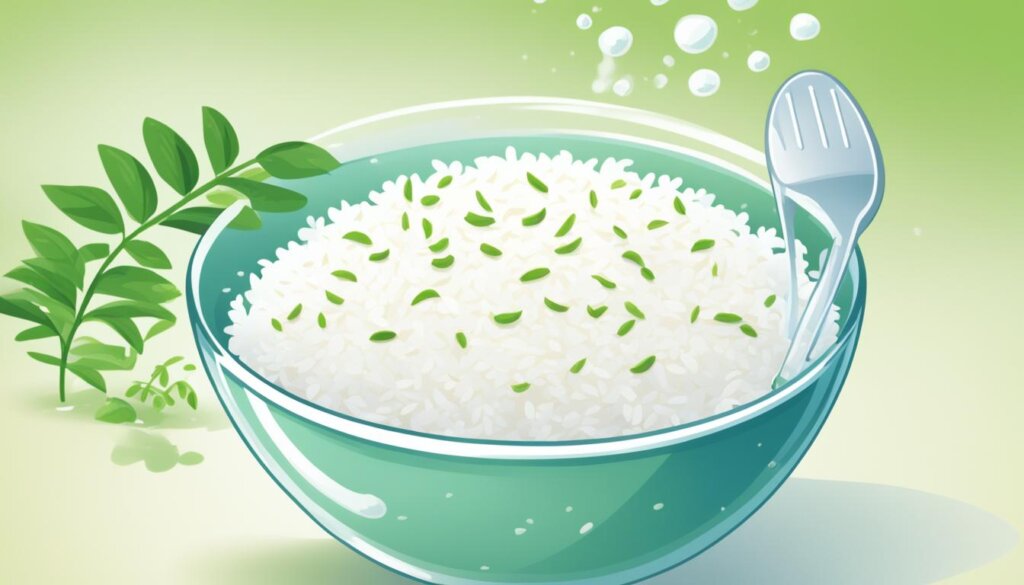
Using these natural ways to help yourself can make diarrhea easier to handle. Don’t forget to drink plenty of water. Avoid dairy for a bit. And if you feel worse, see a doctor right away.
Foods and Drinks to Avoid During Diarrhea
It’s crucial to watch what you eat and drink when you have diarrhea. Some can make your symptoms worse and make you feel bad longer.
Avoid foods high in fat, greasy, and fried. They’re hard to digest and might irritate your stomach more. Stay away from spicy foods and acidic ones like citrus fruits, pineapples, and tomatoes too.
If you’re sensitive to dairy, skip it for now. This is because many people can’t digest lactose well when they have diarrhea. Be careful with processed meals and foods high in fiber too.
Stay off drinks with caffeine like coffee, tea, and sodas. They make your gut more active, which is bad for diarrhea. Also, say no to alcohol. It makes you lose more water, which you need to avoid dehydration.
Choose plain and simple foods to eat. The BRAT diet is good now. It’s bananas, rice, applesauce, and toast. Cooked cereals, soda crackers, and soft, plain potatoes are also fine.
Only drink water and broths that are clear. Add electrolytes to your water if you can. Pedialyte, weak tea, and coconut water help replace fluids and electrolytes you’ve lost.
Thinking about what you eat and drink matters a lot when you have diarrhea. It can make you feel better and help your body heal.
Exercise and Diarrhea: What You Need to Know
Exercising when you have diarrhea can make you lose more fluids and electrolytes. This might make your stomach problems worse.
If you’re prone to getting the runs when running long distances, it’s important to manage your hydration. Avoid foods high in FODMAPs and go easy on the exercise until you feel better.
Long runs, like marathons, can trigger diarrhea. So can intense activities like weightlifting or cycling. It’s key to keep your body hydrated to prevent diarrhea. This is especially true for pregnant women nearing their due date.
If you catch a bout of diarrhea, stick to simple foods like what the BRAT diet suggests. This means bananas, rice, applesauce, and toast are your go-to snacks. Sometimes, you might want to use meds like Imodium on big exercise days. Trying to steer clear of foods that stir up gas, high-fat meals, spicy dishes, and certain drinks can also lower your risk of diarrhea after working out.
If your diarrhea is serious or won’t let up after two days, talk to a doctor. In the U.S., millions get diarrhea every year, per the National Institute of Diabetes and Digestive and Kidney Diseases. A study in 2022 found that running longer increases the likelihood of getting the runs among participants.
Some over-the-counter meds can ease diarrhea symptoms. But NSAIDs taken before exercise can up your diarrhea risk. For pregnant folks and others prone to diarrhea, watching hydration is crucial. And avoid wearing clothes that are too tight because they may cause digestive issues during exercise.
Feel caution if loose poop comes with fever, bad pain, or signs of dehydration. Washing hands can cut down diarrhea cases by 30 percent, points out the U.S. Department of Health and Human Services. The Mayo Clinic recommends calling the doctor if diarrhea lasts over two days. Bismuth subsalicylate in over-the-counter meds can help with gut inflammation and fight off diarrhea-causing bugs.
It’s wise to skip hard workouts when you’re dealing with diarrhea. It could lead to more dehydration, bellyache, nausea, and heartburn, which won’t do your body any favors. By knowing how exercise affects your gut, you can be better prepared to protect your digestive health. This means you can still enjoy an active life, even when dealing with stomach issues.
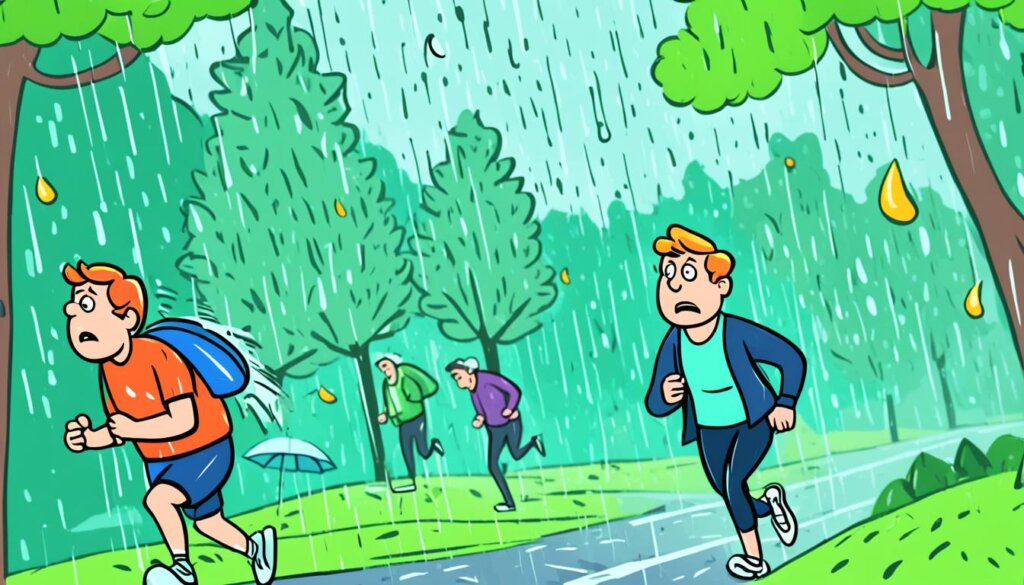
Ginger, Chamomile, and Lemongrass for Diarrhea
If you’re dealing with diarrhea, don’t turn to medicine right away. Several natural options might help calm your symptoms.
For thousands of years, people have used ginger for stomach problems. It can ease the upset stomach and queasiness that come with diarrhea. Chamomile tea, when mixed with other plants, is good for diarrhea. Lemongrass tea might cut down how bad diarrhea is from viruses. These teas are a gentle way to try and feel better.
But, if diarrhea does not get better after a few days, talk to a doctor. This is especially true if it comes with other bad symptoms or if you are very sick. They can help you figure out the best treatment for you.
Keep drinking water and eating mild foods like the BRAT diet. This diet includes bananas, rice, applesauce, and toast which can help with diarrhea. Mixing these foods with herbal teas and listening to your body can help you feel better soon.
Supplements for Diarrhea: Glutamine and Probiotics
Diet and lifestyle changes can help fight diarrhea. Also, supplements like glutamine and probiotics might ease symptoms.
Glutamine is a must-have amino acid. It helps folks recover from diarrhea caused by gut infections. Taking 15 grams daily for 8 weeks seems to reduce diarrhea signs in some IBS patients. Glutamine plays a key role in keeping the gut healthy. It’s a preferred energy source for the gut’s cells.
Probiotic supplements pack good bacteria, including Lactobacillus and Bifidobacterium. They might boost gut health and cut down diarrhea symptoms. Evidence about their success is mixed. Yet, some research says they can help, especially after antibiotics or infections.
Talk to a doctor before starting any new supplement, especially if you’re dealing with health issues. The U.S. Food and Drug Administration (FDA) doesn’t monitor supplements as closely as drugs.
“Supplements can be a helpful addition to the management of diarrhea, but they should be used alongside other evidence-based treatments and under the guidance of a healthcare professional.”
Adding glutamine and probiotics might help ease your diarrhea issues. But if symptoms don’t get better or get worse, see a doctor. It could be a sign of a bigger health problem.
Managing Chronic Diarrhea
Acute diarrhea usually goes away in a few days. But, some people might have chronic diarrhea that lasts over four weeks. This type of diarrhea could be linked to issues like irritable bowel syndrome, Crohn’s, or celiac disease. To manage it, one might need to change their diet, take medicine, and talk a lot with their doctor.
Diet and medicines are common causes of chronic diarrhea. Eating certain sugars, like sorbitol, might not sit well with some bodies. The same goes for lactulose. Pills like NSAIDs and certain antibiotics can also lead to this problem.
Chronic diarrhea might also be a sign of a more serious health issue. Tests on samples of your stool can help the doctor see what’s wrong. They might find inflammation, bugs, or fat in the stool pointing to other diseases.
Healing chronic diarrhea means tackling what’s causing it. It could mean big or small changes to what you eat and how you live.
Doctors might also prescribe special medicines. Don’t forget to drink enough water to keep from getting dehydrated. Over-the-counter drugs such as bismuth or loperamide might help for a while. But remember, they’re not for long-term use. Home treatments like probiotics and adding more fiber can also be helpful.
Chronic diarrhea can make you lose too much of your body’s water and salts. This could lead to big problems with your health. If you start feeling dehydrated, it’s time to see a doctor. Not getting help can even be dangerous.
Working with a doctor is key to beating chronic diarrhea and its dangers. What the future looks like depends on what’s causing the problem. Fixing that can help you get back to normal.
“Chronic diarrhea can be a debilitating condition, but with the right approach and medical guidance, it can be effectively managed.”
Conclusion
Diarrhea can be bad but you can make it better with some home treatments. Drink lots of water and eat simple foods like the BRAT diet. Also, probiotics, ginger, and herbal teas are good. Try banana, ghee, nutmeg, cardamom, or rice with yogurt. Ginger water and yogurt, black tea with lemon, and nutmeg or cardamom teas work well.
Most cases of diarrhea are over in a few days. If it doesn’t go away or if you get very dehydrated, see a doctor. Look out for blood in the stool or a high fever. It’s key to drink plenty of water.
Knowing the best ways to handle diarrhea helps a lot. Focus on what causes it and the right home treatments. Be wise in taking care of yourself. This way, you can deal with diarrhea fast and get well soon.
To wrap up, the best home remedies for diarrhea are simple. Stay hydrated, eat the BRAT diet, and add probiotics. Also, try ginger, tea, and fermented foods. Most diarrhea cases fix themselves without a doctor. But, if it stays bad, get help. Handling diarrhea well gets you back to your normal life.
FAQ
What is diarrhea and what causes it?
Diarrhea makes bowel movements loose and watery. It’s often due to infections, food poisoning, or certain medications. It might also be a sign of ongoing illnesses like Crohn’s disease.
Why is it important to stay hydrated during diarrhea?
Diarrhea can quickly lead to dehydration. This happens because the body loses water and important minerals. Drinking water and other special drinks helps replace what’s lost.
What is the BRAT diet and how can it help with diarrhea?
The BRAT diet includes bananas, rice, applesauce, and toast. These foods are easy on the stomach. They can make diarrhea less frequent by firming up your stools.
How can probiotics help with diarrhea?
Probiotics are tiny organisms that can support a healthy gut. They may cut down on how long diarrhea lasts and how bad it gets. Adding probiotics to your diet or as a supplement could be helpful.
What are some effective over-the-counter (OTC) medications for diarrhea?
Medicines like Loperamide (Imodium) and Bismuth subsalicylate (Pepto-Bismol) can stop or lessen diarrhea. Loperamide slows down your gut, while Bismuth subsalicylate helps fight off the germs causing it.
When should I seek medical attention for diarrhea?
Call your doctor if the diarrhea won’t go away, even after a few days at home. Also, if you see blood in your stool, have a high fever, or feel very dehydrated, seek medical help. Children or older adults with diarrhea need a quick medical checkup if it lasts more than a day.
What home remedies can help alleviate diarrhea?
The BRAT diet and drinking lots of fluids are great starts to feel better. Adding remedies like rice water, chamomile, ginger, or lemongrass tea might also do the trick. These teas are known for their calming effects on the stomach.
What foods and drinks should I avoid during diarrhea?
Avoid greasy, fried foods, foods high in fiber, and drinks with caffeine or alcohol. For those who are lactose intolerant, staying away from dairy is best. These can all make diarrhea worse.
How does exercise affect diarrhea?
Hard exercise can make diarrhea’s effects worse, causing more loss of fluids and minerals. People who do long runs may also get what’s called “runner’s diarrhea.” It’s best to take it easy on the exercise when you’re unwell.
Can supplements help manage diarrhea?
Supplements like glutamine and certain probiotic strains could help your gut heal. These should be taken after talking with your doctor. Getting professional advice before trying new supplements is always wise.
How can I manage chronic diarrhea?
Chronic diarrhea needs a careful plan, including diet changes and possibly medicines. Work closely with your doctor to look for the root problem, which could be something like IBS, Crohn’s, or celiac disease. They can recommend the right steps for you.


